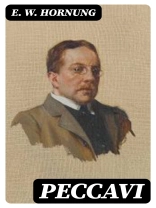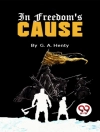E. W. Hornung’s ‘Peccavi’ is a masterful exploration of moral ambiguity and the human condition set against the gritty backdrop of Victorian England. The novella employs a rich, atmospheric style that conjures vivid imagery and complex characterizations, reflecting the era’s literary preoccupations with crime and morality. Hornung deftly weaves a narrative that oscillates between tension and introspection, illuminating the struggles of a protagonist grappling with guilt and redemption, while the title itself—a Latin term meaning ‘I have sinned’—foreshadows the thematic depth of the text. Hornung, perhaps best known for his creation of the gentleman thief A. J. Raffles, infuses ‘Peccavi’ with his keen understanding of societal undercurrents and human psychology. His personal experiences as a member of the British upper class, coupled with his fascination for the darker aspects of life and character, likely informed the visceral themes present in this work. It reflects his interest in the dualities of man—both the refined and the delinquent—drawing readers into the complexities of human motivation. This novella is highly recommended for readers seeking a nuanced examination of morality within a historical context. Hornung’s profound insights and elegant prose render ‘Peccavi’ a compelling study in ethical dilemmas and a significant addition to the crime literature canon. For those intrigued by the intersection of psychology and morality, Hornung’s work is a must-read.
Despre autor
Ernest William Hornung, better known as E. W. Hornung (1866–1921), was an English author and poet best recognized for his creation of the gentleman thief character, A. J. Raffles, who first appeared in ‘The Amateur Cracksman’ (1899). Hornung was born in Middlesbrough, England, and was educated at Uppingham School before working in Australia for a few years. His time in Australia influenced some of his later writing, providing authentic backdrops to stories that reflected the landscapes and experiences he encountered. After his return to England, he matured into a notable writer of the crime genre, with ‘Peccavi’ (1900), a book whose title is Latin for ‘I have sinned’, marking one of his numerous works that encapsulate his literary style. This style often combined suspense with a keen insight into human character, set against the moral contrasts of Victorian and Edwardian society. While Hornung’s Raffles stories were the pinnacle of his popular success, his other works, such as ‘Peccavi’, demonstrated his versatility as a writer and his capacity for exploring different moral and social themes outside the adventures of his famed literary creation. Hornung’s contribution to English literature was significant, and his works continue to be read and appreciated for their engaging narratives and sharp societal observations.












